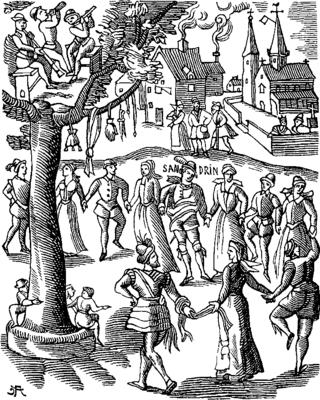Related Research Articles

New Year is the time or day at which a new calendar year begins and the calendar's year count increments by one. Many cultures celebrate the event in some manner. In the Gregorian calendar, the most widely used calendar system today, New Year occurs on January 1. This was also the first day of the year in the original Julian calendar and the Roman calendar.

A festival is an extraordinary event celebrated by a community and centering on some characteristic aspect or aspects of that community and its religion or cultures. It is often marked as a local or national holiday, mela, or eid. A festival constitutes typical cases of glocalization, as well as the high culture-low culture interrelationship. Next to religion and folklore, a significant origin is agricultural. Food is such a vital resource that many festivals are associated with harvest time. Religious commemoration and thanksgiving for good harvests are blended in events that take place in autumn, such as Halloween in the northern hemisphere and Easter in the southern.

In the Gregorian calendar, New Year's Day is the first day of the year; 1 January. Whilst most solar calendars begin the year regularly at or near the northern winter solstice, cultures that observe a lunisolar or lunar calendar celebrate their Lunar New Year at less fixed points relative to the solar year.

The calendar of saints is the traditional Christian method of organizing a liturgical year by associating each day with one or more saints and referring to the day as the feast day or feast of said saint. The word "feast" in this context does not mean "a large meal, typically a celebratory one", but instead "an annual religious celebration, a day dedicated to a particular saint".

Nowruz is the Iranian or Persian New Year celebrated by various ethnicities worldwide. It is a festival based on the Iranian Solar Hijri calendar, on the spring equinox—on or around 21 March on the Gregorian calendar.

Adherents of Zoroastrianism use three distinct versions of traditional calendars for liturgical purposes, all derived from medieval Iranian calendars and ultimately based on the Babylonian calendar as used in the Achaemenid empire. Qadimi ("ancient") is a traditional reckoning introduced in 1006. Shahanshahi ("imperial") is a calendar reconstructed from the 10th century text Denkard. Fasli is a term for a 1906 adaptation of the 11th century Jalali calendar following a proposal by Kharshedji Rustomji Cama made in the 1860s.
Public Holidays in India, also known as Statutory Holidays, or colloquially Government Holidays, consist of a variety of cultural, nationalistic, and religious holidays that are legislated in India at the union or state levels. While many of these holidays are honored and acknowledged nationwide, state legislation varies regarding which are officially recognized.

The September equinox is the moment when the Sun appears to cross the celestial equator, heading southward. Because of differences between the calendar year and the tropical year, the September equinox may occur anytime from September 21 to 24.

Puthandu, also known as Tamil New Year, is the first day of year on the Tamil calendar, traditionally celebrated as a festival by Tamils as the first day of the Tamil month Chittirai. It falls on or about 14 April every year on the Gregorian calendar. The same day is observed elsewhere in South and South East Asia as the traditional new year, but is known by other names such as Vishu in Kerala, and Vaisakhi or Baisakhi in central and northern India.

Mehregan or Jashn-e Mehr is a Zoroastrian and Iranian festival celebrated to honor the yazata Mithra, which is responsible for friendship, affection and love.

Sadeh, is an Iranian festival that dates back to the Achaemenid Empire. Sadeh celebrates 50 days before Nowruz. Sadeh in Persian means "hundred" and refers to one hundred days and nights remains to the beginning of spring. Sadeh is a mid winter festival that was celebrated with grandeur and magnificence in ancient Persia. It was a festivity to honor fire and to defeat the forces of darkness, frost, and cold.

The Christmas season or the festive season is an annually recurring period recognized in many Western and other countries that is generally considered to run from late November to early January. It is defined as incorporating at least Christmas Day, New Year's Day, and sometimes various other holidays and festivals. It also is associated with a period of shopping which comprises a peak season for the retail sector and a period of sales at the end of the season. Christmas window displays and Christmas tree lighting ceremonies when trees decorated with ornaments and light bulbs are illuminated are traditions in many areas.

Zoroastrianism has numerous festivals and holy days, all of which are bound to the Zoroastrian calendar. The Shahenshahi and Kadmi variants of the calendar do not intercalate leap years and hence the day of the Gregorian calendar year on which these days are celebrated shifts ahead with time. The third variant of the Zoroastrian calendar, known as either Fasli or Bastani, intercalates according to Gregorian calendar rules and thus remains synchronous with the seasons. For details on the differences, see Zoroastrian calendar.

Visperad or Visprad is either a particular Zoroastrian religious ceremony or the name given to a passage collection within the greater Avesta compendium of texts.
Lists of holidays by various categorizations.

Frawardigan is a ten-day period at the end of the Zoroastrian religious year during which the souls of the dead are commemorated.
Farvardinegan is a yearly Zoroastrian ceremony. It should not be confused with the other 10 Zoroastrian days of remembrance known as Frawardigan. This ceremony takes place on Farvardin 19th. Farvardinegan is a ceremony to remember the deceased; it is celebrated as a feast, and the spirits of the deceased are called to unite in their joy.
The Feast of the Assembly is a Yazidi festival.
References
- ↑ Gahambar, Building & Celebrating Community, heritageinstitute.com, Zoroastrian Heritage, Author: K. E. Eduljee